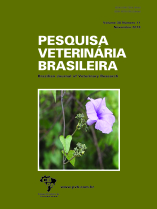 |
|
|
|
Year 2018 - Volume 38, Number 11
|

|
Detection of swainsonine and calystegines in Convolvulaceae species from the semiarid region of Pernambuco, 38(11):2044-2051
|
ABSTRACT. - Mendonça F.S., Silva Filho G.B., Chaves H.A.S., Aires L.D.A., Braga T.C., Gardner D.R., Cook D. & Buril M.T. 2018. [Detection of swainsonine and calystegines in Convolvulaceae species from the semiarid region of Pernambuco]. Detecção de swainsonina e calisteginas em espécies de Convolvulaceae da região semiárida de Pernambuco. Pesquisa Veterinária Brasileira 38(11):2044-2051. Laboratório de Diagnóstico Animal, Departamento de Morfologia e Fisiologia Animal, Universidade Federal Rural de Pernambuco, Rua Dom Manoel de Medeiros s/n, Dois Irmãos, Recife, PE 52171-900, Brazil. E-mail: fabio.mendonca@pq.cnpq.br
Numerous plant species worldwide including some Ipomoea (Convolvulaceae) and Sida (Malvaceae) species in Brazil cause lysosomal storage disease in herbivores and are known to contain swainsonine and calystegines as the main toxic compounds. The aim of this work was to determine swainsonine and calystegines concentrations in species of Convolvulaceae from the semiarid region of Pernambuco. Seven municipalities in the Moxotó region were visited and nine species were collected and screened for the presence of swainsonine and calystegines using an HPLC-APCI-MS method. The presence and concentration of these alkaloids within the same and in different species were very variable. Seven species are newly reported here containing swainsonine and/or calystegines. Ipomoea subincana contained just swainsonine. Ipomoea megapotamica, I. rosea and Jacquemontia corymbulosa contained swainsonine and calystegines. Ipomoea sericosepala, I. brasiliana, I. nil, I. bahiensis and I. incarnata contained just calystegines. The discovery of six Ipomoea species and one Jacquemontia species containing toxic polyhydroxy alkaloids reinforces the importance of this group of poisonous plants to ruminants and horses in the semiarid region of Pernambuco. Epidemiological surveys should be conducted to investigate the occurrence of lysosomal storage disease associated to these new species. |
| |
|
|
| |
|
 |